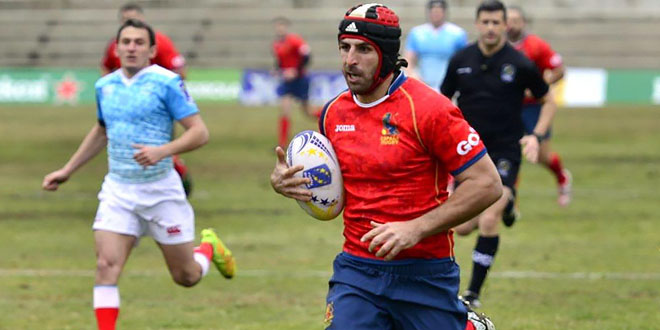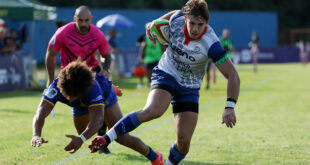The extraordinary situation emerging from the Rugby Europe World Cup qualification has taken yet another turn. On Sunday it was confirmed that Belgium had fielded an ineligible player against Germany, and in fact it has since come to light that a second Belgian player is also in question.
Who that individual is specifically is unknown but Oliver Claxton started against Romania and was originally named as a replacement for the match against Spain. Like Victor Paquet, who was later found to be ineligible, he was replaced before kickoff. Thankfully that situation would have no effect on the results as Romania won the match he was involved with comfortably.
Just yesterday we discovered that Romania have been selecting Sione Faka’osilea since early 2017 despite the fact that under World Rugby Regulation 8 he is ineligible to play for them. Russia have since asked World Rugby for an explanation and we have yet to hear a resolution for disaster in Brussels with a possible replay between Belgium and Spain still on the cards.
Today we have a new problem. Spanish internationals Thibaut Visensang and Mathieu Bélie have been singled out having represented France Under-20 in matches when the French age-grade team had been nominated as their ‘Next Senior’ representative side. This in itself does not make them ineligible as Regulation 8.3 requires the opposing team to also be designated as the ‘Next Senior’ representative side, meaning a match between France u20 and England u20 would not be ‘binding’ as England have a senior ‘A’ side – the Saxons.
This situation arose in a memorable selection battle in 2012. Steve Shingler, playing for London Irish at the time, was selected for a Scotland training squad having previously represented Wales at u20 level. Shingler was eligible for Scotland through his Dumfries-born mother but because he had played for Wales u20 against France u20 in March 2011 he was deemed ‘captured’ by Wales and therefore ineligible to represented Scotland.
According to the BBC, Shingler “claimed he was not aware an appearance for Wales Under-20s had decided his international eligibility.” However the Welsh Rugby Union disputed that fact, and released a statement: “The Welsh Rugby Union has today written to the IRB outlining the process followed to inform all players who represented Wales against France at U20 level in 2011 that their future potential international status was aligned only to selection for Wales at senior level.”
In the end World Rugby sided with Wales and Shingler was withdrawn from the Scotland squad. How much weight was given to the fact that the WRU had, in fact, informed Shingler of the situation before the match is unclear and is something worth noting.
Possibly as a result of this situation World Rugby made an amendment to Regulation 8.3 in the 2014 World Rugby Handbook and clarified the situation with Explanatory Guideline 6(c) which reads as follows:
“Effective 1 July 2014, the Players on any
such Team which participates in the World Rugby Junior World
Championships, World Rugby Junior World Trophy or the Six
Nations U20 Championship (where they are present at the Match
played by that Team either as a replacement, substitute or playing
member of that Team and has, at the time of the Match, reached the
age of majority) will be captured. In this regard the status of the
opposition teams in any Match in these named tournaments is not a
factor to be considered.”
Another point of clarification is found in 6(b) stating:
“Notwithstanding the Union’s obligation to inform the
Player and team management it shall be the sole responsibility of
each Player to ensure that he is aware of the status of every Match
in which he plays and the implications of playing in an International
Match involving the senior or next senior National Representative
Teams of two Unions.”
It should be noted that those amendments were made in 2014 and not retroactively applied. Visensang represented France in eight matches across the 2011 u20 Six Nations and IRB Junior World Championship. Only France and Wales, however, had nominated their u20s as the ‘Next Senior’ representative side, meaning the match between the two is the only one that could have ‘captured’ players. Visensang did not appear in that match and is therefore eligible to represent Spain on account of ancestry.
The case of Bélie, unfortunately, is more complicated. As was the case in 2011, in 2008 both France and Wales had designated their u20 teams as ‘Next Senior’ representative side. Belie did, in fact, play against Wales on June 14 in their Pool D match at the IRB Junior World Championship. In theory this would mean that Bélie is therefore ‘captured’ by France and is ineligible to represent Spain.
Here’s where things get complicated. If we simply go by the Shingler precedent and the Regulation as it was written Bélie is clearly ineligible. What we don’t know, however, is whether French officials informed Bélie prior to the match that in doing so he would be locking in his eligibility, as Wales clearly did in the Shingler case. This is important, and there are reasonable explanations why Bélie would not immediately assume that his eligibility was in question. Again, the revision to Guideline 6(b) made above is not retroactively applicable.
Up until 2006 France had always fielded a senior ‘A’ side which was officially designated as ‘Next Senior’ representative side. In 2007 they switched it to their u21 side and subsequently their u20 side in 2008 to follow the new IRB age-grade guidelines. France ‘A’ was reformed in 2009 taking part in the IRB Nations Cup and stayed for a further year, with the u20s again nominated as ‘Next Senior’ side beginning in 2011.
Given that this is hardly a consistent pattern there seems to be reasonable doubt that the French management informed Bélie prior to the match and he therefore was not aware that he would be captured by playing against Wales. Note again that only the match against Wales in this case was important. The other four matches he appeared in during the tournament did not count. In fact Bélie also played for France against Wales earlier that year in the u20 Six Nations, a match that would be considered binding. The same assumptions can be made that it’s possible that he was unaware such matches were ‘binding’ him to France.
As was the case with Faka’osilea and Romania, Bélie did not take the ‘Olympic Loophole’ route to qualify for Spain so that is out of the equation. What is, however, in Bélie’s favor is that he is otherwise eligible to represent Spain on ancestry. Also different in this case is that there are suggestions that Spain had already cleared Bélie prior to his selection.
According to Jorge Noguera Gonzalez José Antonio Vera of Spanish publication Diario AS, the Spanish Rugby Federation (FER) is confident that Bélie’s selection is not a problem in the eyes of World Rugby. What this means exactly is, again, unclear. It’s possible the FER has already approached World Rugby and certainly in this case his prior selection to France u20 was well-known. He had also been selected on several occasions to Spanish sides without making an appearance before finally making his test debut against Russia in February 2016, which possibly indicates that due diligence was applied.
There is – wait for it – yet another factor to consider. A landmark decision by World Rugby in May of 2017 redefined the eligibility laws completely and in doing so removed the possibility for any team to designate their u20 team as ‘Next Senior’ representative side.
The question is whether this can now be applied retroactively. Unlike the 2014 revision which would place restrictions on players that were previously not in place, this new change would remove restrictions. The new wording of the Explanatory Guideline 6(c) suggests that retroactive application is not the case: “With effect from January 1, 2018, Unions may not designate their Under 20s National Representative Team as their next senior National Representative Team.”
Again, however, there is room for interpretation and the key statement here remains as it did before: “Up until December 31, 2017, Unions who designate their Under 20s National Representative Team as their next senior National Representative Team have a particular onus to clearly make the Team Players aware of the consequences of being captured for that Union at age grade level.”
Bélie started in the No10 shirt in all eight of Spain’s World Cup qualifying matches across the 2017 and 2018 Rugby Europe Championships. If the May 2017 revision were applied retroactively it would mean that Bélie was a legitimate selection in 2018 but not 2017, meaning four of the results could theoretically be overturned. If he is in fact entirely ineligible Spain would surely be disqualified from the competition. Unlike the Romania case, however, this is not cut-and-dry and there is evidence to suggest that World Rugby would clear Bélie if they have not already.
So where do things stand today? Belgium vs Spain may or may not be replayed, Romania may or may not be disqualified, Spain may or may not be disqualified, the Rugby Europe board is due to meet on Thursday and nobody knows who will be playing Portugal for the European Play-off match (very) tentatively scheduled for April 4.
Once again the rugby world is left scratching its head. Arising from the fog is one clear, undeniable truth – Rugby Europe has been woefully mismanaged and whether World Rugby is directly or indirectly responsible they absolutely have an obligation to clean up the mess. ‘Clarity’ is the word of the day and institutional reform the only way to find it.
 Americas Rugby News Rugby news from across the Americas!
Americas Rugby News Rugby news from across the Americas!




